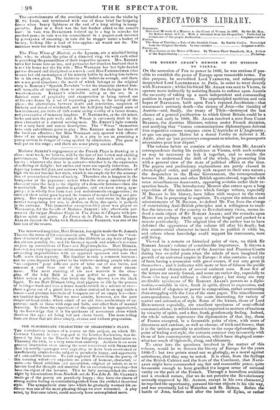The Three Wives of Madrid, at the Lyceum, are a
mischief-loving trio, w ho, to obtain the prize of a diamond ring, vie with each other in punishing the peccadilloes of their respective spouses. Mrs. KEELEY turns her house into an inn, and persuades her drunken husband that it is not his home nor she his wife ; Miss 'WooLasst has her light-heeled partner dressed and disciplined as a monk ; and Miss FAIRBROTHER tries to cure her old curmudgeon of his miserly habits by making him believe he is his own ghost. The incidents are ludicrous enough, and there are some good situations ; the merit of which belongs to the original story ii ROSCOE'S "Spanish Novelists "—for the dramatist showed him- self incapable of turning them to account, and the dialogue is flat to wearisntoeness. KEELEY'S admirable acting as the sot, in a fuddled state of perplexity and exasperation at being turned out of his ow n house by a set of roi stering guests, is the saving of the pie( e: the alternations between doubt and conviction, suspicion of trickery and dread of witchcraft, and his half-jolly half-stupid state of bew ilderrnent, are traits of rich comic acting worthy of a better drama, and nrovocative of immense laughter. F. MerruEws, as the old miser, looks and acts the part well; and A. WIGAN is extremely droll in the stale character of a starved serving-man. Mr. EbIERY'S light comedy is of a very hard and coarse description. The Wives" themselves have only subordinate parts to play : Mrs. KEELEY made her share of the business effective; but Miss WOOLGAR Only sported with affecta- tions of an unbecoming kind. It is a pity to see so promising It young actress in danger of being spoiled by admiration. The piece is well put on the stage ; and there are some pretty scenic effects.


























 Previous page
Previous page